|
|
Some common misconceptions about alchemy Back to introduction Alchemy came from ancient Egypt. It is not true to say that alchemy was being practiced in ancient Egypt during the temple building period. Ancient Egyptian civilisation has been very closely studied, as as such a mass of documentated material has survived one would expect to find clear references to alchemy from this period. This is not the case, however, and all one finds are a few references and images of standard chemical processes. The first references to true alchemy, with its idea of transmutation seems to be from the third and fourth century A.D. Greco-Roman Egypt. Even the early written chemical documents, the Leiden and Stockholm papyri, which date from the late 3rd century A.D. are not truly alchemical, and though they describe processes for making metals look like gold, they present this merely as counterfeiting and have no sense of transmutation. Alchemists were persecuted by the church as heretics.  This is not true. Alchemists were never seen as heretics as they did not develop or preach a doctrine counter to the Roman Church. Most alchemists had quite conventional religious values. They were not dragged up before the Inquisition, or burned at the stake. The historical documents do not record such events. The idea that such things took place seems to derive from the imaginations of popularist and speculative writers of the 20th century, who conflated alchemists with witches and heretics. Alchemy was, however, at times made illegal, as the authorities feared that they might make gold and so devalue the currency and thus destroy the economy of the time. In the 14th century the Church authorities were rather worried about the developing interest among monks in distillation and alchemy that they banned monks from practicing it as they feared it would divert them from their proper contemplation of the Scriptures. Over the centuries a number of fraudulent alchemists were prosecuted by the state authorities for deceit, and in some cases these unfortunate individuals were imprisoned or in some instances executed. A well known example of this is the case of Cajetani, an Italian alchemist who defrauded so many people that he was made an example of by being hung on a golden gallows. He was not executed for his ideas but for being a common crimimal and stealing money from people by deception. This is not true. Alchemists were never seen as heretics as they did not develop or preach a doctrine counter to the Roman Church. Most alchemists had quite conventional religious values. They were not dragged up before the Inquisition, or burned at the stake. The historical documents do not record such events. The idea that such things took place seems to derive from the imaginations of popularist and speculative writers of the 20th century, who conflated alchemists with witches and heretics. Alchemy was, however, at times made illegal, as the authorities feared that they might make gold and so devalue the currency and thus destroy the economy of the time. In the 14th century the Church authorities were rather worried about the developing interest among monks in distillation and alchemy that they banned monks from practicing it as they feared it would divert them from their proper contemplation of the Scriptures. Over the centuries a number of fraudulent alchemists were prosecuted by the state authorities for deceit, and in some cases these unfortunate individuals were imprisoned or in some instances executed. A well known example of this is the case of Cajetani, an Italian alchemist who defrauded so many people that he was made an example of by being hung on a golden gallows. He was not executed for his ideas but for being a common crimimal and stealing money from people by deception.
Alchemy was part of a secret conspiracy involving the Knights Templar, Rosicrucians and the Illuminati. This again is merely a fiction of the overheated imaginations of the twentieth century popularist writers. Alchemists were not part of a secret society. They were individuals struggling in different ways to explore the nature of substance. They were not part of a group. One can see this clearly through examining their letters and personal notebooks. Alchemists were for the most part strong individuals working alone to explore the nature of substance in their laboratories, or in other cases pursuing a more theoretical investigation of the basis of alchemical philosophy. They often criticised and held different views from other alchemists and thus alchemy certainly never had a governing hierarchical structure as is found in secret societies. Such secret societies in any case are very short lived as they rapidly implode due to inevitable personality struggles and schizms. Alchemy, on the other hand, survived in Europe for about 600 years (from the 12th through to the 18th centuries) which is indicative of its continuing evolution and adaptation to each new age through the work of individuals. Alchemy evolved and changed as is clearly seen by studying the writings of the alchemists. |
Introduction Reading list Some quotations Frequently asked questions Common misconceptions Timeline The different ways of looking at alchemy -------
Proto-chemistrySymbolism Psychology allegorical journeys mysticism metaphysical historians of ideas 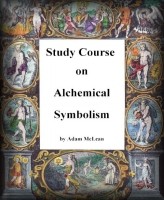 Study Courses
Study Courses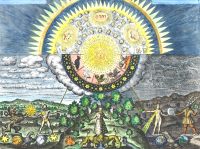 Alchemical, astrological and emblematic art prints 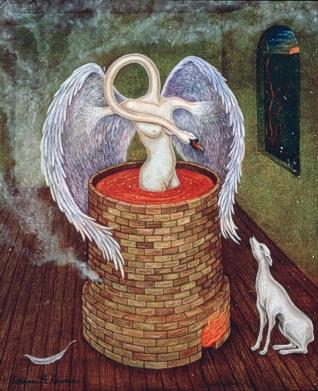 Alchemy and art 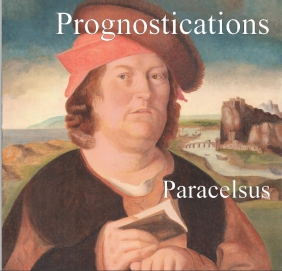 Art books Series 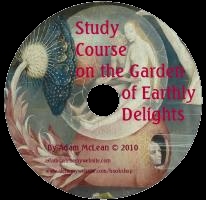 Study course on Bosch's Garden of Earthly Delights New Hieronymus Bosch Website |